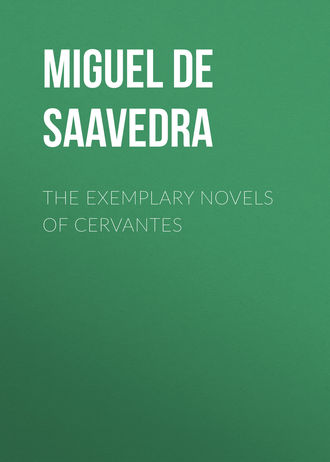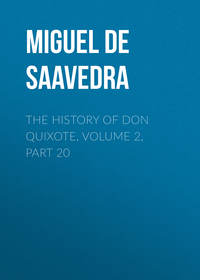 полная версия
полная версияThe Exemplary Novels of Cervantes
Loaysa hid himself, and the dueña bent her ear to listen for her master's footsteps; but hearing nothing, she took courage by degrees, and stealing on tip-toe to his bed-room, she found him snoring there as soundly as ever. Back she ran, at her best speed, to gladden her mistress's heart with the joyful intelligence; and then discreetly resolving not to lose so lucky an opportunity of being the first to enjoy the good graces of the musico, she told Leonora to wait there whilst she went and called him. Hastily entering the room where he was concealed, she found him sorely discomfited by the untoward issue of his adventure, cursing the inefficiency of the ointment, the credulity of his friends, and his own want of forethought in not making an experiment with the ointment on some other person before he tried its effect on Carrizales. But when the dueña assured him that the old man was sleeping as soundly as ever, there was an end to all his uneasiness, and he lent a complacent ear to the very liquorish language in which Marialonso addressed him. "Oho," said he to himself, "that's what you would be at, is it? Well, you will do capitally as a bait to fish with for your lady."
Whilst this tête-à-tête was pending, the rest of the women had one by one crept out of their several hiding-places, to see if it was true that their master was awake; and finding all still in the house, they returned to the saloon where they had left their mistress. Having learnt from her that the alarm had been a false one, they asked what had become of the musico and the dueña. Leonora told them that Marialonso had gone to fetch the maestro, whereupon they all stole out of the room as noiselessly as they had entered it, and set themselves to listen at the door to what was passing between the pair. Guiomar was one of the party, but the negro was not among them; for upon the first alarm he had run off, hugging his guitar, and hid himself in his loft, where he lay huddled up under the bed-clothes, sweating with terror; in spite of which he could not forbear from tinkling the guitar from time to time, so inordinate – may Satanas confound him! – was his love of music. The soft speeches of the amorous dueña were distinctly heard by the group outside the door; and there was not one of them but bestowed a blessing upon her from the wrong side of the mouth, with the addition of sundry epithets which I had rather not repeat. The result of the confabulation between the pair was that Loaysa would comply with the dueña's desires, provided that first of all she brought her mistress to consent to his. It cost the dueña something to subscribe to these conditions; but, after all, there was nothing she would not have done to compass the gratification of the desires that had laid hold on her soul and body, and were undermining her very bones and marrow. The bargain was struck; and quitting the room to go and speak to her mistress, she found all the rest of the women assembled round the door. Putting a bold face on the matter, she bade them all go to bed, and next night they should be able to enjoy themselves without any such false alarm as had spoiled their sport for that time. The women all knew well that the old dueña only wanted to be left alone; but they could not help obeying her, for she had command over them all.
Having got rid of the servants, the dueña went back to the saloon, and began to exercise her powers of persuasion upon Leonora. She made her a long and plausible harangue, so well put together that one might have supposed she had composed it beforehand. She extolled the good looks of the gentle musico, the elegance of his manners, his wondrous suavity, and his countless other good qualities; represented how infinitely more agreeable must be the caresses of such a charming young gallant than those of the old husband; assured her the affair would never be discovered, and plied her with a thousand other arguments which the devil put into her mouth, all so specious and so artfully coloured, that they might have beguiled the firmest mind, much more that of a being so artless and unwary as poor Leonora. O dueñas, born and used for the perdition of thousands of modest, virtuous beings! O ye long plaited coifs, chosen to impart an air of grave decorum to the salas of noble ladies, how do you reverse the functions of your perhaps needful office! In fine, the dueña talked with such effect, that Leonora consented to her own undoing, and to that of all the precautions of the wary Carrizales, whose sleep was the death of his honour. Marialonso took her mistress by the hand, led the weeping lady almost by force to Loaysa, and wishing them much joy with a diabolical leer, she left them both shut in together, and laid herself down in the saloon to sleep, or rather to await the reward she had earned. Overcome, however, by the loss of rest on two successive nights, she could not keep her eyes open, but fell fast asleep on the carpet.
And now, if we did not know that Carrizales was asleep, it would not be amiss to ask him, where now were all his jealous cares and precautions? What now availed the lofty walls of his house, and the exclusion from it of every male creature? What had he gained by his turning-box, his thick walls, his stopped up windows, the enormously strict seclusion to which he had doomed his family, the large jointure he had settled on Leonora, the presents he was continually making her, his liberal treatment of her attendants, and his unfailing alacrity in supplying them with everything he imagined they could want or wish for? But as we have said, he was asleep. Had he been awake, and disposed to reply, he could not have given a better answer than by saying, as he shrugged his shoulders and arched his eyebrows, that all this had been brought to nought by the craft of an idle and vicious young man, and the wickedness of a faithless dueña, working upon the weakness of an artless and inexperienced girl. Heaven save us all from such enemies as these, against whom the shield of prudence and the sword of vigilance are alike impotent to defend us!
Such, nevertheless, was Leonora's rectitude, and so opportunely did she manifest it, that all the villanous arts of the crafty seducer were of no avail; till both of them, wearied by the contest, the baffled tempter and the victorious defender of her own chastity, fell asleep almost at the moment when it pleased Heaven that Carrizales should awake in spite of the ointment. As usual he felt all about the bed, and not finding his dear wife in it, he jumped up in the utmost consternation, and with strange agility for a man of his years. He looked all over the room for her, and when he found the door open, and the key gone from between the mattresses, he was nearly distracted. Recovering himself a little, he went out into the gallery, stole softly thence to the saloon, where the dueña was asleep, and seeing no Leonora there, he went to the dueña's own room, opened the door gently, and beheld Leonora in Loaysa's arms, and both of them looking as if the soporific ointment was exerting its influence over themselves instead of upon the jealous husband.
Carrizales was petrified with horror; his voice stuck in his throat; his arms fell powerless by his sides, and his feet seemed rooted to the ground; and though the fierce revulsion of his wrath presently aroused his torpid senses, he yet could scarcely breathe, so intense was his anguish. Thirsting for vengeance as terrible as his monstrous wrong, but having no weapon at hand, he returned to his chamber as stealthily as he had quitted it, in search of a dagger, with which he would wash out the stain cast upon his honour in the blood of the guilty pair, and then massacre his whole household; but he had no sooner reached his room than his grief again overpowered him, and he fell senseless on the bed.
Day broke now, and found Leonora still in the arms of Loaysa. Marialonso awoke, and thinking it time to receive what she counted was due to her, she awoke Leonora, who was shocked to find it so late, and bitterly accused her own imprudence and the dueña's negligence. With trembling steps the two women crept up to Felipe's bedroom, praying inwardly to Heaven that they might find him still snoring; and when they saw him lying on the bed, apparently asleep, they made no doubt that he was still under the effect of the opiate, and embraced each other in a transport of joy. Leonora went up to her husband, and taking him by the arm, turned him over on his side to see if he would wake without their being obliged to wash him with vinegar according to the directions given with the ointment; but the movement roused Carrizales from his swoon, and heaving a deep sigh, he ejaculated in a faint and piteous tone, "Miserable man that I am! to what a woeful pass I am come!"
Leonora did not distinctly hear what her husband said; but seeing with surprise that the effect of the opiate was not so lasting as she had been led to expect, she bent over him, put her cheek to his, and pressing him closely in her arms, said, "What ails you, dear señor? You seem to be complaining?"
Carrizales opened his eyes to their utmost width, and turning them full upon her, stared at her a long while with a look of profound amazement. At last he said, "Do me the pleasure, señora, to send instantly for your parents in my name, and ask them to come hither, for I feel something at my heart which distresses me exceedingly. I fear I have but a short time to live, and I should like to see them before I die."
Leonora immediately despatched the negro with this message to her parents. She fully believed what her husband had told her, and attributing his danger to the violence of the opiate instead of to its real cause, she put her arms round his neck, caressed him more fondly than ever she had done before, and inquired how he felt, with such tender solicitude, as if she loved him above everything in the world; while he, on the other hand, continued to gaze upon her with the same unvarying look of astonishment, every endearing word or caress of hers being like a dagger to his heart. The dueña had, by this time, acquainted Loaysa and the domestics with her master's illness, which, she remarked, was evidently very serious, since he had forgotten to give orders that the street door should be locked after the negro's departure to summon her lady's parents. The message was itself a portentous occurrence, for neither father nor mother had ever set foot within that house since their daughter's marriage. In short, the whole household was in anxiety, though no one divined the true cause of the old man's illness. He lay sighing at intervals, so heavily that every sigh seemed like the parting of soul and body. Leonora wept to see him in such a state, whilst he beheld her feigned tears, as he deemed them, with a bitter smile, that looked like the grin of insanity.
Leonora's parents now arrived, and were struck with no little misgivings when they found both entrance doors open and the house all lonely and silent. They went up to their son-in-law's room, and found him in the posture he had all along maintained, with his eyes immovably fixed on his wife, whom he held by the hands, whilst both were in tears; she, because she saw his flow, and he at seeing how deceitfully she wept. As soon as they entered the room, Carrizales begged them to be seated, ordered all the domestics to withdraw except Marialonso, then wiped his eyes, and with a calm voice and an air of perfect composure addressed them thus: —
"I am sure, my respected father and mother-in-law, I need no other witnesses than yourselves to the truth of what I have now to say to you in the first place. You must well remember with how much love and what tender affection I received your daughter when you bestowed her upon me one year, one month, five days, and nine hours ago, as my lawful wife. You know, also, with what liberality I behaved to her, for the settlement I made upon her would have been more than enough to furnish three young ladies of her quality with handsome marriage portions. You must remember the pains I took to dress and adorn her with everything she could desire or I could think of as suitable to her. It is known to you likewise how, prompted by my natural disposition, fearful of the evil to which I shall surely owe my death, and taught by the experience of a long life to be on my guard against the many strange chances that occur in life, I sought to guard this jewel which I had chosen and you had bestowed upon me, with all possible care and caution. I raised the walls of this house higher, blocked up all the windows that looked on the street, doubled the locks of the doors, set up a turning-box as in a nunnery, and perpetually banished from my dwelling every vestige of the male sex. I gave my wife female servants and slaves to wait upon her: I denied neither her nor them anything they chose to ask of me. I made her my equal, communicated my most secret thoughts to her, and put my whole property at her disposal. Having done all this, I thought I might fairly expect to enjoy securely what had cost me so much, and that it would be her care not to afford me cause for conceiving any kind of jealous fear whatever. But it is not within the power of human efforts to prevent the chastisement which Heaven is pleased to inflict on those who do not rest their whole hopes and desires upon it alone. No wonder then if mine have been deceived, and I have myself prepared the poison of which I am now dying. But I see how anxiously you hang upon the words of my mouth. I will therefore keep you no longer in suspense, but conclude this long preamble by telling you, in one word, what no words were adequate to describe, were I to speak for ever. This morning I found this woman," (here he pointed to his wife,) "who was born for the ruin of my peace and the destruction of my life, in the arms of a young gallant, who is now shut up in the bed-chamber of this pestilent dueña."
Carrizales had no sooner uttered these words than Leonora swooned, and fell with her head upon his lap. Marialonso turned as white as ashes, and Leonora's parents were so astounded that they could not utter a word. After a short pause, Carrizales continued thus: —
"The vengeance I intend to take for this outrage shall be no common one. As I have been singular in all my other actions, so will I be in this. My vengeance shall fall upon myself, as the person most culpable of all, for I ought to have considered how ill this girl's fifteen years could assort with my threescore and ten. I have been like the silkworm, which builds itself a house in which it must die. I do not reproach you, misguided girl" – here he bent down and kissed his still insensible wife – "for the persuasions of a wicked old woman, and the wheedling tongue of an amorous youth, easily prevail over the little wit of a green girl; but that all the world may see how strong and how true was the love I bore you, I shall give such a proof of it here on my death-bed, as the world has never seen or heard of; – one that shall remain an unparalleled example, if not of goodness, at least of singleness of heart. I desire that a notary be immediately sent for to make my will, wherein I will double Leonora's jointure, and recommend her, after my death, which will not be long delayed, to marry that young man whom these gray hairs have never offended. Thus she will see that, as in life I never departed in the slightest particular from what I thought could please her, so I wish her to be happy when I am no more, and to be united to him whom she must love so much. The rest of my fortune I will bequeath to pious uses, after leaving to you both wherewith to live honourably for the rest of your days. Let the notary come instantly, for the anguish I am now suffering is such that, if it continues, my time here will be very short."
Here Carrizales was seized with a terrible swoon, and sank down so close to Leonora that their faces touched. During this scene the dueña stole out of the room, and went to apprize Loaysa of all that had happened. She advised him to quit the house immediately, and she would take care to keep him informed of all that was going on, for there were no locked doors now to hinder her from sending the negro to him whenever it was necessary. Astounded at this news, Loaysa took her advice, put on his beggar's rags again, and went away to make known to his friends the strange issue of his amour.
Leonora's father, meanwhile, sent for a notary, who arrived soon after both husband and wife had recovered their senses. Carrizales made his will in the manner he had stated, without saying anything of his wife's transgressions; he only declared that, for good reasons, he advised, and begged her to marry, should he die, that young man of whom he had spoken to her in private. When Leonora heard this, she threw herself at her husband's feet, and cried, while her heart throbbed as if it would burst, "Long may you live, my lord and my only joy; for though you may not believe a word I say, indeed, indeed I have not offended you, except in thought."
More she would have said, but when she attempted to exculpate herself by a full statement of what had really occurred, her tongue failed her, and she fainted away a second time. The poor old man embraced her as she lay; so, too, did her parents – all three weeping bitterly; and even the notary could not refrain from tears. Carrizales gave the negro and the other slaves their liberty, and left all the servants enough to maintain them; the perfidious Marialonso alone was to have nothing beyond the arrears of her wages. Seven days afterwards Carrizales was laid in his grave.
Leonora remained a mourning though wealthy widow; and whilst Loaysa expected that she would fulfil the desire which he knew her husband had expressed in his will, he learned that within a week she had become a nun in one of the most austere and rigid convents in all Seville. Mortified by this disappointment, he left the country and went to the Indies. Leonora's father and mother were deeply grieved, but found consolation in the wealth which their son-in-law had bequeathed them. The two damsels likewise consoled themselves, as did the negro and the female slaves, the former being well provided for, and the latter having obtained their freedom; the wicked dueña alone was left to digest, in poverty, the frustration of her base schemes. For my part I was long possessed with the desire to complete this story, which so signally exemplifies the little reliance that can be put in locks, turning-boxes, and walls, whilst the will remains free; and the still less reason there is to trust the innocence and simplicity of youth, if its ear be exposed to the suggestions of your demure dueñas, whose virtue consists in their long black gowns and their formal white hoods. Only I know not why it was that Leonora did not persist in exculpating herself, and explaining to her jealous husband how guiltless she had been in the whole of that unhappy business. But her extreme agitation paralysed her tongue at the moment, and the haste which her husband made to die, left her without another opportunity to complete her justification.
THE ILLUSTRIOUS SCULLERY-MAID
In the famous city of Burgos there lived two wealthy cavaliers, one of whom was called Don Diego de Carriazo, and the other Don Juan de Avendaño. Don Diego had a son called after himself, and Don Juan another, whose name was Don Tomas de Avendaño. These two young gentlemen being the principal persons of the following tale, we shall for the sake of brevity call them Carriazo and Avendaño.
Carriazo might be about thirteen or little more, when, prompted by a scampish disposition, without having had any cause to complain of bad treatment at home, he ran away from his father's house, and cast himself upon the wide world. So much did he enjoy a life of unrestricted freedom, that amidst all the wants and discomforts attendant upon it, he never missed the plenty of his father's house. He neither tired of trudging on foot, nor cared for cold or heat. For him all seasons of the year were genial spring. His sleep was as sound on a heap of straw as on soft mattresses, and he made himself as snug in a hayloft as between two Holland sheets. In short, he made such way in the profession he had chosen, that he could have given lessons to the famous Guzman de Alfarache.
During the three years he absented himself from home, he learned to play at sheepshanks in Madrid, at rentoy in the public-houses of Toledo, and at presa y pinta in the barbacans of Seville. In spite of the sordid penury of his way of life, Carriazo showed himself a prince in his actions. It was easy to see by a thousand tokens that he came of gentle blood. His generosity gained him the esteem of all his comrades. He seldom was present at drinking bouts; and though he drank wine, it was in moderation, and he carried it well. He was not one of those unlucky drinkers, who whenever they exceed a little, show it immediately in their faces, which look as if they were painted with vermilion or red ochre. In short, the world beheld in Carriazo a virtuous, honourable, well-bred, rogue, of more than common ability. He passed through all the degrees of roguery till he graduated as a master in the tunny fisheries of Zahara, the chief school of the art. O kitchen-walloping rogues, fat and shining with grease; feigned cripples; cutpurses of Zocodober and of the Plaza of Madrid; sanctimonious patterers of prayers; Seville porters; bullies of the Hampa, and all the countless host comprised under the denomination of rogues! never presume to call yourself by that name if you have not gone through two courses, at least, in the academy of the tunny fisheries. There it is that you may see converging as it were in one grand focus, toil and idleness, filth and spruceness, sharp set hunger and lavish plenty, vice without disguise, incessant gambling, brawls and quarrels every hour in the day, murders every now and then, ribaldry and obscenity, singing, dancing, laughing, swearing, cheating, and thieving without end. There many a man of quality seeks for his truant son, nor seeks in vain; and the youth feels as acutely the pain of being torn from that life of licence as though he were going to meet his death. But this joyous life has its bitters as well as its sweets. No one can lie down to sleep securely in Zahara, but must always have the dread hanging over him of being carried off to Barbary at any moment. For this reason, they all withdraw at night into some fortified places on the coast, and place scouts and sentinels to watch whilst they sleep; but in spite of all precautions, it has sometimes happened that scouts, sentinels, rogues, overseers, boats, nets, and all the posse comitatus of the place have begun the night in Spain and have seen the dawn in Tetuan. No apprehensions of this kind, however, could deter Carriazo from spending three successive summers at the fisheries for his pastime; and such was his luck during his third season, that he won at cards about seven hundred reals, with which he resolved to buy himself good clothes, return to Burgos, and gladden the heart of his sorrowing mother.
He took a most affectionate leave of his many dear friends, assuring them that nothing but sickness or death should prevent his being with them in the following summer; for his heart was in Zahara, and to his eyes its parched sands were fresher than all the verdure of the Elysian fields. Ambling merrily along on shanks' mare, he arrived at Valladolid, where he stopped a fortnight to get rid of the mahogany hue of his complexion, and to change his rogue's costume for that of a gentleman. Having equipped himself properly, he had still a hundred reals left, which he spent on the hire of a mule and a servant, that he might make a good figure when he presented himself to his parents. They received him with the utmost joy, and all the friends and relations of the family came to congratulate them on the safe arrival of their son Don Diego de Carriazo. I had forgotten to mention that, during his peregrination, Don Diego had taken the name of Vidiales, and by that name alone he was known to his new acquaintances.
Among those who came to see the new arrival were Don Juan de Avendaño and his son Don Tomas, with the latter of whom, as they were both of the same age and neighbours, Carriazo contracted a very close friendship. Carriazo gave his parents a long and circumstantial account of all the fine things he had seen and done during the three years he had been from home, in all which there was not one word of truth; but he never so much as hinted at the tunny fisheries, though they were constantly in his thoughts, more especially as the time approached in which he had promised his friends he would return to them. He took no pleasure in the chase, with which his father sought often to divert him, nor in any of the convivial meetings of that hospitable city. All kinds of amusements wearied him, and the best enjoyments that could be offered to him were not to be compared, he thought, with those he had known at the tunny fisheries. His friend Avendaño, finding him often melancholy and musing, ventured to inquire after the cause, at the same time professing his readiness to assist his friend in any way that might be requisite, and to the utmost of his power, even at the cost of his blood. Carriazo felt that it would be wronging the great friendship subsisting between him and Avendaño if he concealed from the latter the cause of his present sadness; and therefore he described to him in detail the life he had led at Zahara, and declared that all his gloom arose from his strong desire to be there once more. So attractive was the picture he drew, that Avendaño, far from blaming his taste, expressed his entire sympathy with it. The end of the matter was that Avendaño determined to go off with Carriazo, and enjoy for one summer that delicious life of which he had just heard such a glowing description; and in this determination he was strongly encouraged to persist by Carriazo, who was glad to be so countenanced in his own low propensities. They set their wits to work to see how they could scrape together as much money as possible, and the best means that occurred to them was that suggested by Avendaño's approaching departure for Salamanca, where he had already studied for three years, and where his father wished him to complete his education, and take a degree in whatever faculty he pleased. Carriazo now made known to his father that he had a strong desire to go with Avendaño and study at Salamanca. Don Diego gladly fell in with his son's proposal; he talked with his friend Don Juan on the subject, and it was agreed between them that the two young men should reside together at Salamanca, and be sent thither well supplied with all requisites, and in a manner suitable to the sons of men of quality.









